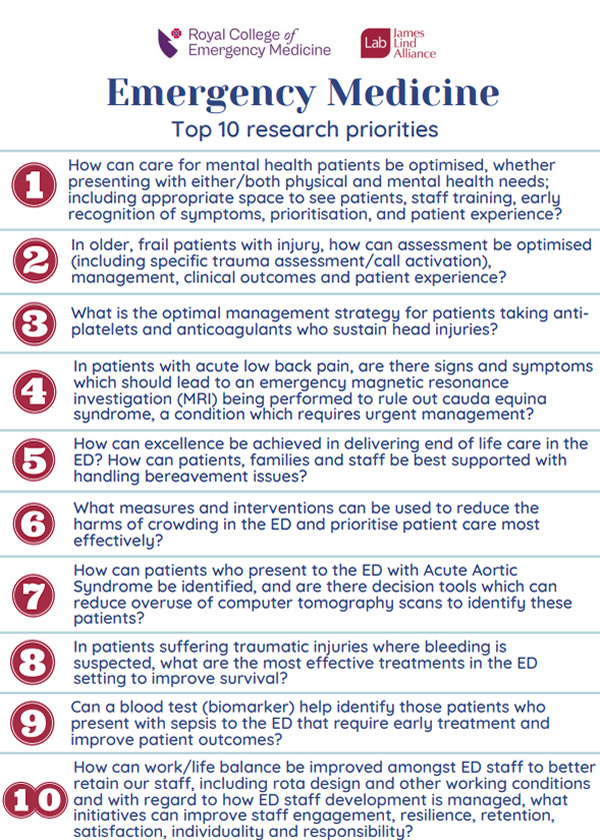
RCEM in partnership with the James Lind Alliance (JLA)
RCEM, in partnership with the James Lind Alliance (JLA), has conducted a Research Priority Setting Partnership with the aim of including patients, carers and clinicians in a process to establish the top research priorities in emergency medicine.
We’re excited to share that after the success of the original PSP, the Royal College of Emergency Medicine have recently completed a refresh of the Emergency Medicine research priorities for the next five years. This will ensure that priorities are current and representative of today’s patients, carers, and clinicians. The new top 10 research priorities in Emergency Medicine can be found below.
In January 2017 the JLA Emergency Medicine Priority Setting Partnership (EM PSP) published its first list of research priorities, providing guidance on the research, learning and development in the field of emergency medicine. Since then, our world and the landscape of emergency medicine have changed significantly, and some of the original priorities have been addressed through funded research studies.

In January 2017 the JLA Emergency Medicine Priority Setting Partnership (EM PSP) published its first list of research priorities, providing guidance on the research, learning and development in the field of emergency medicine. Since then, our world and the landscape of emergency medicine have changed significantly, and some of the original priorities have been addressed through funded research studies.
+ Why was this important?
Emergency Medicine is a broad, dynamic subject area and includes a variety of different medical areas such as acute medical emergencies, minor illness and injury, major trauma, acute mental health problems and the management of elderly patients with complex co-morbidities and social problems (not to mention the current challenges posed by COVID-19). Defining research priorities for such a diverse speciality and large potential patient base is a significant but rewarding challenge, driving innovation in the field. What’s more the EM PSP refresh will help to connect researchers and funders with real world experience.
The process involved research questions being collected, screened and added to a long list in survey format so that individuals that wished to take part in the survey were able to rank each of the research questions. The survey was open over summer of 2022 and closed in early September. The results of the survey allowed us to develop a short-list of the top 26 ranked research questions which were brought to the final workshop at the end of September.
The aim of the workshop was to review and agree the top 10 questions for research into Emergency Medicine. This will help researchers focus on finding answers to questions which will make the most difference to people who need to use an Emergency Medicine Department, and to those who work there. Workshop participants included individuals with lived experience, and health and care professionals who work within this area. Participants discussed in small and larger groups the short-list of 26 questions and decided together about which 10 research questions that they believed should be prioritised.
The James Lind Alliance (JLA) is a not-for-profit organisation, working to bring patients, carers and clinicians together in Priority Setting Partnerships (PSP) to identify and prioritise the Top 10 unanswered questions or evidence uncertainties that they agree are the most important.
This was our second time around collaborating with the JLA, and we were delighted to be partnering with them again.
You can find out more about the JLA here, and you can find the EM PSP here.
